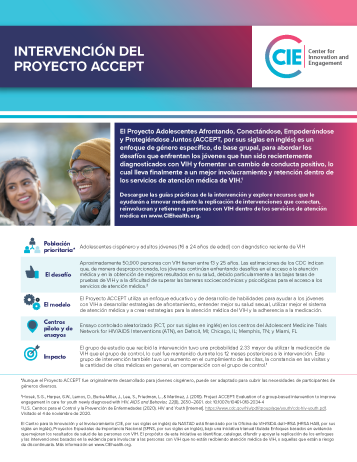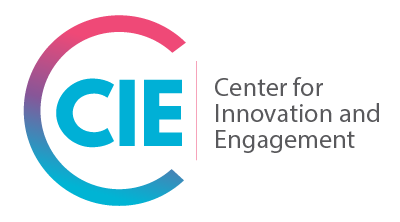
Summary
Project Adolescents Coping, Connecting, Empowering, and Protecting Together (ACCEPT) was developed for cisgender youth ages 16 to 24 with HIV. Using a peer-facilitated, information- and skills-building framework, the intervention leverages both individual and group sessions to address issues that influence youth engagement in HIV care, including stigma, disclosure, healthy relationships, substance use, and future life planning.
Implementation Resources
Tips for Implementing the Intervention
Intervention Outcomes
- The intervention group had a 2.33 greater likelihood of HIV medication usage than the control group, which was sustained 12 months post-intervention.
- The intervention group had increased appointment adherence, visit constancy, and overall medical visits compared to the control group.
- Clients were more likely to have a declining viral load over time.
Intervention Components
- Define Intervention Population and Data Measures
- Secure Stakeholder Buy-In
- Assess Staff Resources and Gaps
- Engage Youth-Centered Community Service Partners
- Assess Local Laws and Regulations
- Recruit Peer Facilitators, Counselors, and Social Workers
- Train Staff on Project ACCEPT Procedures and Facilitate Knowledge Exchange
- Recruit Youth with HIV
- Increase Youth Skills to Engage in HIV Medical Care and Social Support
Cost Analysis
The Project ACCEPT intervention cost analysis is not currently available. However, you can use the CIE Cost Calculator to create an estimate of the cost of implementing the intervention at your organization.
Challenges and Solutions
| Challenge | Solution |
|---|---|
| Client reluctance to engage with health care providers | Engage providers who have experience with youth and who competently communicate in a manner that reduces stigma and promotes empathy and compassion. Use peers as client-provider liaisons. |
| Funding | Discuss the following with your organization’s leadership: ways to repurpose existing funding to support specific intervention components; or ways to collaborate with external partners to secure resources to implement Project ACCEPT. |
| Non-inclusive training curricula and facilitator guides | Tailor your training curricula and counseling sessions for gender-diverse youth and ensure that you offer inclusive services. |
Supplementary Resources
Publications
- Predictors and profiles of antiretroviral therapy adherence among African American adolescents and young adult males living with HIV
- Project ACCEPT: Engaging newly diagnosed HIV+ youth in care. A multi-center study of the Adolescent Medicine Trials Network for HIV/AIDS Interventions (ATN 108, Ver 1.0).
- Project ACCEPT: Evaluation of a group-based intervention to improve engagement in care for youth newly diagnosed with HIV.
- An ecological model of stressors experienced by youth newly diagnosed with HIV.
- Evaluating the acceptability and feasibility of Project ACCEPT: An intervention for youth newly diagnosed with HIV.
- Effects of Pediatric Chronic Physical Disorders on Child and Family Adjustment.
Resources
- Project ACCEPT Intervention Manual (PDF)
- Project ACCEPT Cisgender Male Participant Handbook (PDF)
- Project ACCEPT Cisgender Female Participant Handbook (PDF)
- ATN 108 Project ACCEPT: Engaging Newly Diagnosed HIV+ Youth in Care. Information for Data Requesters – Data Sharing and Possible Collaboration (PDF)
- Talking Points: The Resource Guide for Facilitating Stigma Conversations
- NASTAD Trauma-Informed Approaches Toolkit

